-
 Bitcoin
Bitcoin $111,259.5910
2.32% -
 Ethereum
Ethereum $2,789.1977
6.17% -
 Tether USDt
Tether USDt $1.0006
0.06% -
 XRP
XRP $2.4172
3.88% -
 BNB
BNB $671.6585
1.21% -
 Solana
Solana $157.1336
2.90% -
 USDC
USDC $1.0001
0.02% -
 TRON
TRON $0.2913
1.52% -
 Dogecoin
Dogecoin $0.1809
5.04% -
 Cardano
Cardano $0.6213
4.40% -
 Hyperliquid
Hyperliquid $41.7572
6.29% -
 Sui
Sui $3.1623
8.35% -
 Bitcoin Cash
Bitcoin Cash $513.7819
1.17% -
 Chainlink
Chainlink $14.2966
1.64% -
 Stellar
Stellar $0.2904
9.82% -
 UNUS SED LEO
UNUS SED LEO $8.9624
-0.86% -
 Avalanche
Avalanche $19.4161
5.41% -
 Hedera
Hedera $0.1754
8.17% -
 Shiba Inu
Shiba Inu $0.0...01243
4.58% -
 Toncoin
Toncoin $2.8743
2.25% -
 Litecoin
Litecoin $90.6242
3.12% -
 Monero
Monero $328.7483
3.34% -
 Polkadot
Polkadot $3.6433
5.06% -
 Dai
Dai $1.0002
0.02% -
 Ethena USDe
Ethena USDe $1.0011
0.06% -
 Uniswap
Uniswap $8.3418
8.66% -
 Bitget Token
Bitget Token $4.4331
2.68% -
 Pepe
Pepe $0.0...01102
8.17% -
 Aave
Aave $297.1705
-0.69% -
 Pi
Pi $0.4712
1.31%
What are the approved Bitcoin ETFs?
Approved Bitcoin ETFs offer a regulated, secure way for investors to gain exposure to Bitcoin without directly owning the cryptocurrency.
Jul 09, 2025 at 03:42 pm
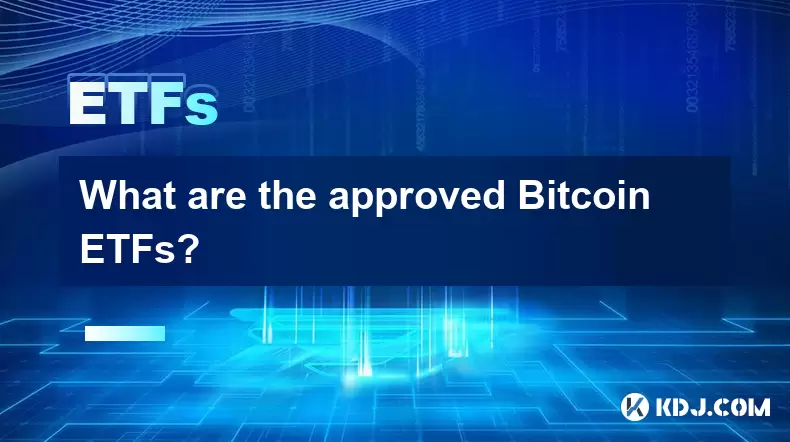
Understanding Bitcoin ETFs and Their Significance
Bitcoin Exchange-Traded Funds (ETFs) represent a financial product that allows investors to gain exposure to Bitcoin without directly owning the cryptocurrency. These funds are approved by regulatory bodies such as the U.S. Securities and Exchange Commission (SEC), and they trade on traditional stock exchanges like regular stocks. The significance of approved Bitcoin ETFs lies in their ability to bring institutional-grade investment tools to retail investors, offering a regulated and secure way to participate in Bitcoin’s price movements.
The approval of Bitcoin ETFs is considered a major milestone because it legitimizes digital assets within the traditional finance ecosystem. Unlike buying and storing actual Bitcoin, which involves risks related to wallet security and private key management, ETFs provide a custodied and liquid solution for those seeking indirect crypto exposure.
Current Status of Bitcoin ETF Approvals
As of now, several asset management firms have submitted proposals for spot Bitcoin ETFs, but many are still under review. In contrast, futures-based Bitcoin ETFs have already received regulatory approvals. One notable example is the ProShares Bitcoin Strategy ETF (BITO), which was approved by the SEC in October 2021. This fund tracks Bitcoin futures contracts rather than holding actual Bitcoin.
However, there has been significant progress in the spot ETF arena. In early 2024, multiple applications from firms like BlackRock, Fidelity, ARK Invest, and WisdomTree were accepted, marking a turning point in the industry. These spot Bitcoin ETFs allow investors to gain direct exposure to Bitcoin prices without dealing with derivatives.
It is crucial to note that while these funds have been approved, their performance and adoption depend on market conditions, investor sentiment, and trading volumes. Each approved ETF comes with its own set of fee structures, custodial arrangements, and tracking mechanisms.
Key Features of Approved Bitcoin ETFs
Approved Bitcoin ETFs come with distinct features that differentiate them from other types of crypto investments. One of the most important aspects is regulatory oversight, which ensures transparency and compliance with financial standards. These ETFs are required to publish daily holdings reports, undergo audits, and adhere to strict custody rules.
Another key feature is liquidity. Since ETFs trade on major exchanges like NASDAQ or NYSE, investors can buy and sell shares throughout the trading day at market prices. This offers greater flexibility compared to holding physical Bitcoin, which requires access to crypto exchanges that may not always be available during off-hours.
Additionally, cost efficiency plays a role in attracting investors. While some ETFs charge higher management fees, others offer competitive rates to encourage inflows. Investors should carefully compare expense ratios, bid-ask spreads, and tracking accuracy before choosing a Bitcoin ETF.
How to Invest in Approved Bitcoin ETFs
Investing in approved Bitcoin ETFs follows the same process as investing in any traditional ETF. Here’s a step-by-step guide:
- Open a brokerage account with a platform that supports ETF trading.
- Ensure the platform provides access to major exchanges where Bitcoin ETFs are listed.
- Search for the specific ETF ticker symbol, such as ARKB for ARK Invest or IBIT for BlackRock.
- Review the fund’s prospectus, expense ratio, and historical performance data.
- Place a buy order using either market or limit instructions based on your strategy.
- Monitor your investment regularly and consider rebalancing if necessary.
It's also important to understand how capital gains taxes apply to ETF investments. Profits from selling ETF shares are subject to capital gains tax, depending on how long the shares were held. Investors should consult with a tax professional to ensure compliance with local regulations.
Differences Between Spot and Futures-Based Bitcoin ETFs
One of the primary distinctions among Bitcoin ETFs is whether they are spot-based or futures-based. Spot ETFs hold actual Bitcoin and aim to track its real-time price. These funds rely on custodians to securely store the underlying assets and ensure accurate price replication.
On the other hand, futures-based ETFs invest in Bitcoin futures contracts, which are derivative instruments tied to Bitcoin’s future price. These contracts often result in a phenomenon known as contango, where the futures price is higher than the expected future spot price. This can lead to performance discrepancies over time.
Spot ETFs are generally preferred by investors who want direct exposure to Bitcoin’s current value, while futures-based ETFs may appeal to traders looking for leverage or hedging opportunities. However, the approval of spot ETFs marks a regulatory shift, indicating growing acceptance of cryptocurrencies within mainstream finance.
Frequently Asked Questions (FAQs)
What is the difference between a Bitcoin ETF and a mutual fund?
A Bitcoin ETF trades on an exchange like a stock, offering intraday liquidity and transparent pricing. A mutual fund, however, is priced once per day after market close and typically involves more complex redemption processes.
Are Bitcoin ETFs safer than buying Bitcoin directly?
Bitcoin ETFs eliminate the need for private key management and wallet security, which are critical when holding actual Bitcoin. However, they still carry market risk and are subject to price volatility similar to the underlying asset.
Can I hold Bitcoin ETFs in my retirement account?
Yes, many brokers allow investors to include Bitcoin ETFs in IRAs or 401(k) accounts, provided the account supports ETF investments. This enables tax-advantaged exposure to Bitcoin through approved products.
Do Bitcoin ETFs pay dividends?
No, Bitcoin ETFs do not generate dividend income because Bitcoin itself does not produce earnings. Any returns come solely from changes in the ETF’s share price relative to Bitcoin’s value.
Disclaimer:info@kdj.com
The information provided is not trading advice. kdj.com does not assume any responsibility for any investments made based on the information provided in this article. Cryptocurrencies are highly volatile and it is highly recommended that you invest with caution after thorough research!
If you believe that the content used on this website infringes your copyright, please contact us immediately (info@kdj.com) and we will delete it promptly.
- ₹50 Coin Conundrum: Public Preference and the Delhi High Court
- 2025-07-10 14:30:11
- PumpFun's PUMP Token: ICO Buzz and Price Prediction
- 2025-07-10 14:50:12
- Bitcoin's Back: Record High Explained, NYC Style
- 2025-07-10 15:10:12
- BlockDAG Presale: Poised for a 30x Upside in 2025?
- 2025-07-10 15:10:12
- Circle, OKX, and USDC Liquidity: A New Era for Stablecoin Accessibility
- 2025-07-10 15:15:12
- BlockDAG Presale: Unlocking Potential Gains in the Crypto Surge of 2025
- 2025-07-10 15:30:11
Related knowledge
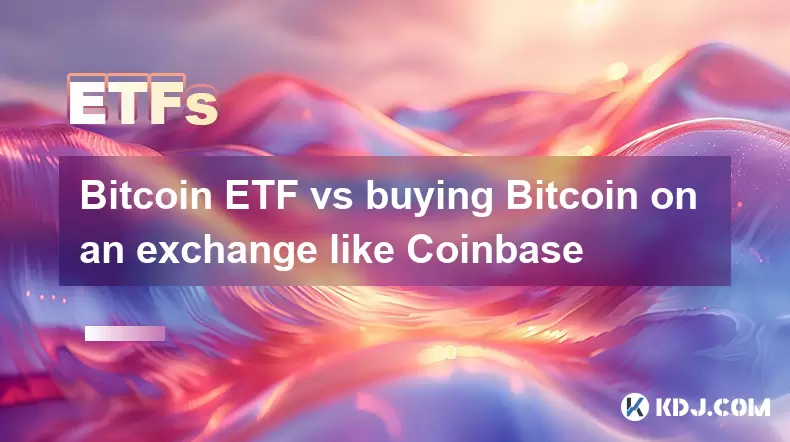
Bitcoin ETF vs buying Bitcoin on an exchange like Coinbase
Jul 09,2025 at 10:15am
What is a Bitcoin ETF?A Bitcoin ETF (Exchange-Traded Fund) is a financial product that tracks the price of Bitcoin without requiring investors to own ...
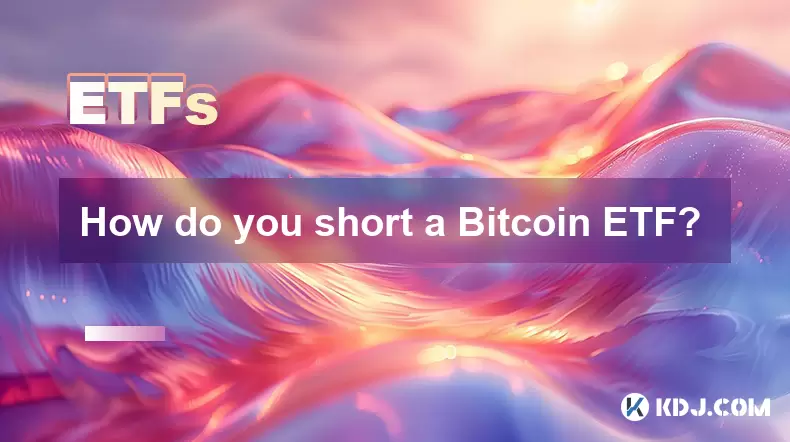
How do you short a Bitcoin ETF?
Jul 09,2025 at 06:14pm
Understanding the Basics of Shorting a Bitcoin ETFShorting a Bitcoin Exchange-Traded Fund (ETF) involves betting that the price of the ETF will fall. ...

Are Bitcoin ETFs covered by SIPC insurance?
Jul 09,2025 at 05:56am
What is SIPC Insurance?SIPC insurance, formally known as the Securities Investor Protection Corporation (SIPC), is a U.S.-based organization that prov...
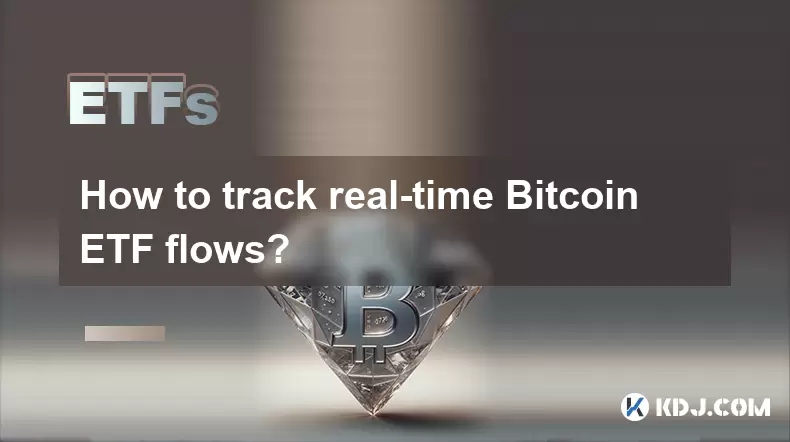
How to track real-time Bitcoin ETF flows?
Jul 09,2025 at 12:56pm
What is a Bitcoin ETF and Why Track Its Flows?A Bitcoin Exchange-Traded Fund (ETF) allows investors to gain exposure to Bitcoin without directly ownin...
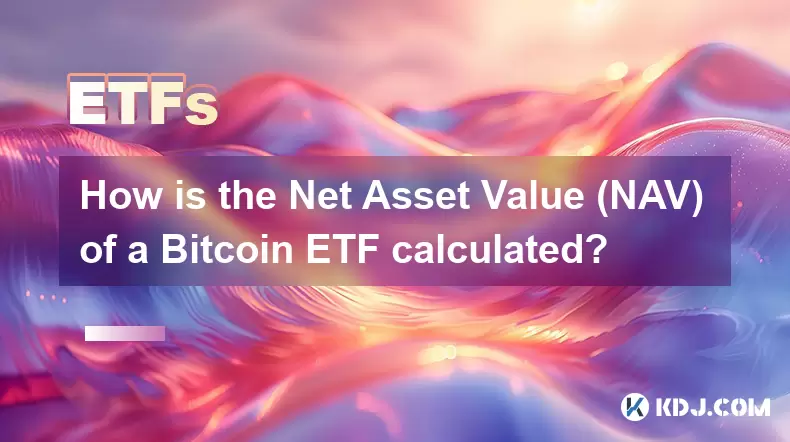
How is the Net Asset Value (NAV) of a Bitcoin ETF calculated?
Jul 09,2025 at 11:56pm
Understanding the Net Asset Value (NAV) of a Bitcoin ETFThe Net Asset Value (NAV) is a critical metric for any Exchange-Traded Fund (ETF), including t...

Are there options trading on Bitcoin ETFs?
Jul 10,2025 at 12:01pm
Understanding Bitcoin ETFs and Their Market RoleBitcoin Exchange-Traded Funds (ETFs) are investment vehicles that track the price of Bitcoin without r...

Bitcoin ETF vs buying Bitcoin on an exchange like Coinbase
Jul 09,2025 at 10:15am
What is a Bitcoin ETF?A Bitcoin ETF (Exchange-Traded Fund) is a financial product that tracks the price of Bitcoin without requiring investors to own ...

How do you short a Bitcoin ETF?
Jul 09,2025 at 06:14pm
Understanding the Basics of Shorting a Bitcoin ETFShorting a Bitcoin Exchange-Traded Fund (ETF) involves betting that the price of the ETF will fall. ...

Are Bitcoin ETFs covered by SIPC insurance?
Jul 09,2025 at 05:56am
What is SIPC Insurance?SIPC insurance, formally known as the Securities Investor Protection Corporation (SIPC), is a U.S.-based organization that prov...

How to track real-time Bitcoin ETF flows?
Jul 09,2025 at 12:56pm
What is a Bitcoin ETF and Why Track Its Flows?A Bitcoin Exchange-Traded Fund (ETF) allows investors to gain exposure to Bitcoin without directly ownin...

How is the Net Asset Value (NAV) of a Bitcoin ETF calculated?
Jul 09,2025 at 11:56pm
Understanding the Net Asset Value (NAV) of a Bitcoin ETFThe Net Asset Value (NAV) is a critical metric for any Exchange-Traded Fund (ETF), including t...

Are there options trading on Bitcoin ETFs?
Jul 10,2025 at 12:01pm
Understanding Bitcoin ETFs and Their Market RoleBitcoin Exchange-Traded Funds (ETFs) are investment vehicles that track the price of Bitcoin without r...
See all articles

























































































